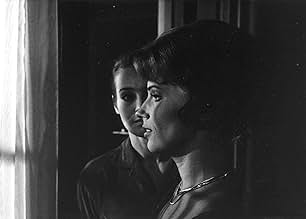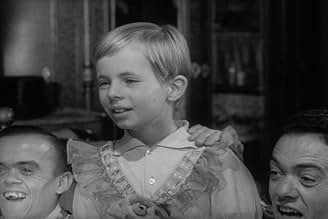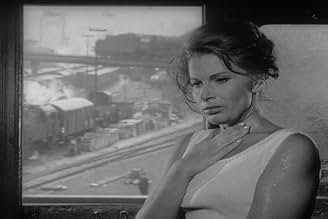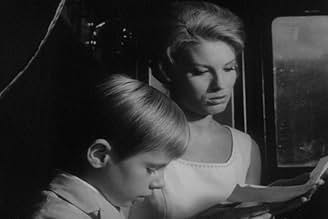Dos hermanas distanciadas, Ester y Anna, y el hijo de diez años de Ana, viajan a un país europeo al borde de la guerra. Ester enferma gravemente y los tres se trasladan a un hotel de un pequ... Leer todoDos hermanas distanciadas, Ester y Anna, y el hijo de diez años de Ana, viajan a un país europeo al borde de la guerra. Ester enferma gravemente y los tres se trasladan a un hotel de un pequeño pueblo llamado Timoka.Dos hermanas distanciadas, Ester y Anna, y el hijo de diez años de Ana, viajan a un país europeo al borde de la guerra. Ester enferma gravemente y los tres se trasladan a un hotel de un pequeño pueblo llamado Timoka.
- Premios
- 3 premios ganados y 2 nominaciones en total
- Woman in Variety Hall
- (sin créditos)
- The Paperboy
- (sin créditos)
- Man in Variety Hall
- (sin créditos)
- Impressario
- (sin créditos)
- The Bar Owner
- (sin créditos)
- The Doorkeeper
- (sin créditos)
- Anna
- (sin créditos)
- The Cashier
- (sin créditos)
- The Old Man
- (sin créditos)
- Dirección
- Guionista
- Todo el elenco y el equipo
- Producción, taquilla y más en IMDbPro
Opiniones destacadas
Often referred to as the third in a trilogy, it is more profoundly the third in a sequence of three world class pieces of cinema, as the emotions and frustrations of Ester (Ingrid Thulin) carry the viewer over a threshold of uncertainty, inconclusiveness, bewilderment and confusion - with Gunnel Lindblom as Anna playing her part to perfection too - but don't ask me why, because the gaps reach to the sky.
"Tystnaden" is a film about lack of connection and communication that in certain moments seems to be a silent movie. There are very few, but sharp and ambiguous, dialogs between the two sisters and it is not clear whether they had an incestuous relationship in the past and the weird way that Anna treats her son, sleeping naked in the bed with him or asking him to soap her back (at least, for non-Swedish viewer). The performances are awesome as usual in a Bergman's film, with wonderful black-and-white cinematography, use of shadows and camera work. My vote is seven.
Title (Brazil): "O Silêncio" ("The Silence")
Bergman's women shine in this film, too, although they must have been exhausted afterwards. Ingrid Thulin and Gunnel Lindblom star as the two sisters, whose apparent incestuous relationship has destroyed them both, Esther (Thulin) physically (she is dying) and Anna (Lindblom) mentally. They arrive, with Anna's son Johan, in a foreign city at war, which creates an uncozy atmosphere around Sven Nykvist's exterior shots. The tanks roll down the city streets, becoming a metaphor of the war of emotions between Anna and Esther. Thulin makes a very physically demanding performance, like Harriet Andersson in "Cries and Whispers" she is dying (of cancer?), and her pain is showing. Anna clearly wants to hurt her sister, who is the oldest and smartest of them, by saying cruel things and playing with Esther's apparent sexual love for her.
Sigmund Freud would have loved this film, and Anna seems to want to break free from her sister by having casual sex with a man she meets at a bar. She then tells her sister about it, and Esther's reactions to this is extremely ambiguous, like most of the film is. Anna's wish to become free of her sister is deeply rooted in childhood experiences, and it leads Anna to say things like "I wish she was dead" to the man who does not understand a word she is saying. All these things make "Tystnaden" the disturbing film it is. The only release is when Johan explores the corridors of the hotel alone, meeting a bunch of short men who perform at a circus-like variete Anna visits to escape from the sight of Esther. But Johan meets a kind (or is he a paedophiliac?) old man who works at the hotel, and it is he who has to care for Esther as she draws her last breaths, Anna tearing Johan away from her sister's arm in a very cruel manner. The long periods of silence in the film perhaps makes the title, or perhaps it means that the silence about the sisters' past is never broken to us, the spectators. A lot is left up to us to interpret, typically of Bergman's cinema.
All in all, a very ambivalent, Freudian and disturbing film from one of the masters of the cinema.
Like the title suggests, it's almost a silent film, and at times a quiet film, but thought provoking
It is, personally, my least favorite in the 'trilogy' of Bergman's (the previous two being the masterpiece Through a Glass Darkly, and the strong Winter Light), but it is a very frank film, and like the best of the theater, Bergman knows that not letting the audience know everything is a bonus, especially when dealing with complexities and up-front issues in this film. For its time it was very controversial due to the sexual nature of the film (it's uncut on the criterion DVD, and it is of note that Bergman is dealing with the carnal side- nudity, loveless passions, suggestions of incest), yet it is mostly an honest portrayal of this.
Ingrid Thulin (Ester) and Gunnel Lindblom (Anna) star as sisters (at least I think they're sisters, by description of the plot, sometimes that too is left unclear) who start off in a train, along with Lindblom's son Johan, played by Jorgen Lindstrom (later to appear in the opening scenes of Persona). Each character is very sharply defined, which carries through the rest of the film- Ester is sick, and lonely, who works part-time as a translator, but mostly acts repressed, sad, and rather disgusted by the actions of her sister Anna (though mostly in a subtle way that gets to her). Anna, meanwhile, is the mother of Johan, who loves her son but usually can't stand to be around the hot, claustrophobic hotel room. She goes out into the jazz music scored city cafés, having strange and explicit encounters (one of the more shocking and effective scenes is inside a theater, where as dwarfs act on the stage, to Anna's right a couple has animistic sex).
She, too, tries to satisfy her emptiness this way, leading to a difficult, harsh climax. The two actresses play their parts, whether it sometimes becomes a little tiresome (in the brooding, Antonioni sense I mean) due to Bergamn's direction, as strong as they can play it. Thulin is, even when she has her Cries & Whispers type scenes, at her best in the film, showing her skills at being calm, inward, and psychologically nuts. Another reviewer commented on the Freudian elements in the film, the obsessions of women, or the repression with it. There is a sharp contrast then with Thulin's thoughtful, hurting performance, and Lindblom's passionate, lusting, and ultimately desperate performance. Each character is only looking for love, and since they can't find it with each other, they can't seem to find it with others outside of the Hotel walls.
Stuck in the middle of them is Johan, who is played by Lindstrom with total innocence, if at times disillusionment. Bergman directs him and writes what he does and observes perfectly- kids usually find things to do even in the most lonely of situations, and there's some fun (if very surreal in the Bergman cannon) in an encounter he has with the dwarfs. But with Johan as well, amid the vast corridors, there is little for him to do. Early on when they get to the hotel, there is a somewhat disturbing little moment where Anna asks for him to wash her back. He does for a few seconds, but stops. She understands in some way, and the two spend a moments of close silence. Being a ten year old without any real connections (he comments to Ester at one point about her not being around) creates a sense of detachment, which pervades almost every scene of the film.
And it is this detachment that I found a little troubling about the film (and not quite in a good way). The themes of the Silence, and its execution, is a little hard to take on the first viewing, and one wonders if it would be more enlightening, depressing, or even worth it for a second viewing. It's not that the Silence is a lessor Bergman work, far from it, but the experimentation that he goes through with the characters is hard to connect with- it's the least of the 'trilogy' that deals with God (at least on the surface like a Seventh Seal), but due to its limited dialog, he relies heavily on symbolism and the straight images of people in emotional desolation, not always workable or connecting.
Still, there is one side to this experimentation that I found to work best- the work with legendary Sven Nyvist. It is an enclosed space, but there is much that is covered in technical terms, and in terms of just the camera-work it is one of Bergman's more inventive and deep touches. The deep focus/long shots in the corridors; the close-ups of Ingrid Thulin's face (upside down in a few scenes, highly effective); the images that race across Johan's eyes, like on the train (the fake tanks), the baroqueness of the butler; the sex scenes in a beautiful mix of truth and illusion.
The Silence demands to have some thought put to it, or at least some emotion, even as it takes its deliberate time: a little empty, but also fulfilling, and in the end asks more personal questions that can't be answered, much like how the other films in the trilogy did with the subject matter.
¿Sabías que…?
- TriviaThe language in the movie is Gun Grut Bergman's creation. She was a translator and linguist in Slavic languages. The name of the city, which is indicated first in the train's speaker, and then by Anna, as Timoka, is a real word however. Bergman found it in a book in Estonian on the bookshelf of his wife Käbi Laretei. When he asked what it meant, she replied "belonging to the hangman".
- Citas
Ester: I didn't want to accept my wretched role. But now it's too damn lonely. We try out attitudes and find them all worthless. The forces are all too strong. I mean the forces... the horrible forces. You need to watch your step among all the ghosts and memories.
Ester: All this talk... There's no need to discuss loneliness. It's a waste of time.
- Versiones alternativasThe original UK cinema release featured the pre-edited US print which was then cut by a further 35 secs by the BBFC to shorten some shots of Ester stroking Anna's hair and to replace subtitled references to erections and semen. The 1999 Tartan video is the complete version.
- ConexionesEdited into Journal d un père (2023)
- Bandas sonorasGoldberg Variations, BWV 988 - Variatio 25
Music by Johann Sebastian Bach
Selecciones populares
- How long is The Silence?Con tecnología de Alexa
Detalles
- Fecha de lanzamiento
- País de origen
- Idiomas
- También se conoce como
- The Silence
- Locaciones de filmación
- Productora
- Ver más créditos de la compañía en IMDbPro
Taquilla
- Total a nivel mundial
- USD 14,199
- Tiempo de ejecución1 hora 36 minutos
- Color
- Relación de aspecto
- 1.37 : 1



























